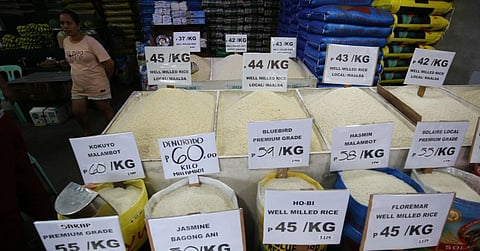
- NEWS
- the EDIT
- COMMENTARY
- BUSINESS
- LIFE
- SHOW
- ACTION
- GLOBAL GOALS
- SNAPS
- DYARYO TIRADA
- MORE

The Action for Economic Reforms (AER), a group of policy analysts and public interest advocates, said the proposed amendments to the Rice Tariffication Law (RTL) may reduce prices of the commodity, but only “artificially.”
AER co-founder and coordinator Filomeno Sta. Ana III said the taxpayers would have to shoulder the substantial costs of producing and distributing the rice from the National Food Authority (NFA).
“The motive in amending the law is for the NFA to sell rice to consumers at an artificially low price. That means huge subsidies and a waste of taxpayer money,” he told DAILY TRIBUNE in a text message.
Speaker Martin Romualdez said the government aims to bring rice prices below P30 per kilo by the third quarter of the year. The commodity presently sells at P40 to P45 per kilo.
Romualdez said they are looking to approve the amendments to the RTL through a substitute bill on its second reading in the House of Representatives by Wednesday.
The amendments will allow the NFA to import rice from accredited vendors who will shoulder the shipping cost, and start direct importation as ordered by the President to ensure a stable rice supply in the country.
The existing RTL, said the NFA, must maintain a sufficient rice buffer stock to be sourced “solely from local farmers.” The amendments are based on House Bills 212, 405, 1562, 9030 and 9547.
However, Sta. Ana said the proposed amendments are redundant. “The current law already says that the role of the NFA is to maintain buffer stocks. With regard to importation, the private sector is already doing it.”
The higher rice prices, the Foundation for Economic Freedom Inc. (FEF) said, were caused by external factors rather than a defective RTL.
“What is not being said is that the soaring prices were brought about by exogenous factors, which are the Ukraine-Russia conflict that resulted in an upswing in fuel and fertilizer prices, and the export ban on non-basmati white rice by India,” the FEF said.
The FEF added the ongoing conflict in the Middle East also pushed up petrol prices, making the production and transport of rice costlier.
The FEF said amendments to the RTL will remove its benefits that have been reaped since former president Rodrigo Duterte signed it into law in 2019.
“It tamed rice inflation from 2019 to 2022 when international rice prices were stable, eliminated rent-seeking activities along the value chain, and generated around P80 billion to enhance productivity of small farmers,” it pointed out.
Under the RTL, import duties will be used to support the Rice Competitiveness Enhancement Fund which must have P10 billion each year until 2025.
